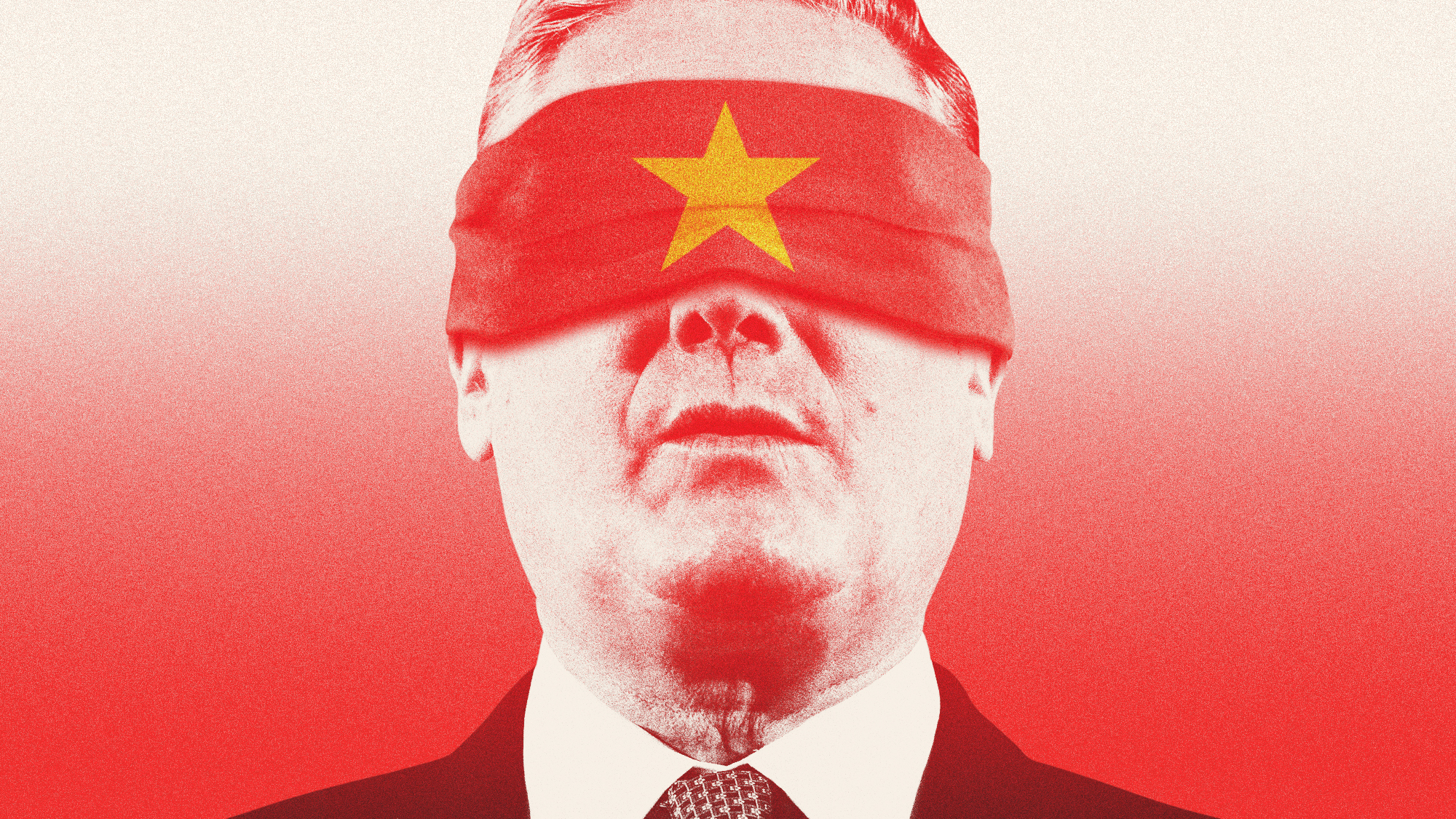Brexit trade talks: what happens next?
Businesses beg for certainty but negotiations with EU may still be months away

A free daily email with the biggest news stories of the day – and the best features from TheWeek.com
You are now subscribed
Your newsletter sign-up was successful
British businesses are warning that lack of clarity about the UK’s post-Brexit relationship with the EU is preventing them from planning for the future.
The Institute of Directors (IoD) is urging the Government to publish its negotiating objectives for the next stage of EU exit talks “as soon as possible”.
In a survey by the organisation, which represents business leaders, 55% of company directors said they would only be able to “make planning and investment decisions” with certainty when “we understand our future with the EU”, The Guardian reports.
The Week
Escape your echo chamber. Get the facts behind the news, plus analysis from multiple perspectives.

Sign up for The Week's Free Newsletters
From our morning news briefing to a weekly Good News Newsletter, get the best of The Week delivered directly to your inbox.
From our morning news briefing to a weekly Good News Newsletter, get the best of The Week delivered directly to your inbox.
And only 35% of the 952 directors surveyed said the information contained in the withdrawal agreement gives them the “certainty needed to make planning and investment decisions”.
“To give businesses any chance of being ready for the new relationship by the end of 2020, the Government needs to be as clear as possible about what its intended destination is,” said Allie Renison, the IoD’s head of Europe and trade policy.
“With directors clear that negotiations with the EU are the priority right now, clarity is crucial for so many companies.”
How will the process work?
A free daily email with the biggest news stories of the day – and the best features from TheWeek.com
Boris Johnson is expected to set out his negotiations objectives in a major speech before mid-February, but there has been “little to no parallel consultation with business to mirror what is going on in Brussels”, says The Guardian.
The EU Commission is currently holding a series of seminars with member state representatives on its goals for negotiations, covering fisheries, energy, transport and law enforcement. The future mobility of EU citizens has already been discussed over the past week, as have space, the European defence fund, and cybersecurity.
Brussels plans to publish draft negotiating guidelines on 1 February, with its goals to be agreed among member states at a meeting on 25 February.
But European Commission spokesperson Eric Mamer said this week that formal talks with the UK may still be months away.
“We have said we will start negotiations as quickly as we can, but it will certainly not be before the end of February, beginning of March,” he said. “This is not a slowing down or speeding up of the process.”
Calling for the British government to clarify its negotiation plans, the IoD’s Renison said: “Avoiding the chaotic uncertainty of leaving the EU without a deal is clearly a relief to business leaders, but they are still much more inclined to feel this Brexit deal on its own doesn’t provide the certainty they need to invest and make plans for the future.”
But Chancellor Sajid Javid pointed out to the Financial Times last week that “companies that have known since 2016 that we are leaving the EU”, although he added: “Admittedly, they didn’t know the exact terms.”
What else do we know?
Javid’s claim that the UK will not be “aligned” with EU rules after trade talks has sparked fears among already anxious business leaders of new post-Brexit trade barriers.
Bosses have warned that new barriers could create unwelcome friction on cross-border trade, with a negative impact on investment, jobs and the economy.
The Government has pledged that a future trading relationship will be agreed with the EU by the end of 2020, but has not released details of what that might involve.
The IoD’s Renison said: “To give businesses any chance of being ready for the new relationship by the end of 2020, the Government needs to be as clear as possible about what its intended destination is.”
Meanwhile, ministers have quietly restarted “no deal” planning amid fears that trade talks with Brussels could collapse.
Whitehall’s EU Exit Operations Committee met last Thursday to start preparations for a “disorderly December”, in the event that Brussels “fail to grasp we really are going at the end of the year”, a cabinet minister who was present told The Mail on Sunday.
Senior Downing Street aide Dominic Cummings reportedly told government advisers at a meeting on Friday evening that “we are not bluffing on the no extension” beyond 2020.
The UK will be looking for a new trade deal with the US to bolster the economy and show Brussels that Britain is capable of going it alone.
“Brexit provides a unique opportunity for the Government to capitalise on the Trump administration’s keenness to get a UK/US trade deal over the line by November’s presidential election,” says The Times.
But the newspaper adds that “sceptics say this is wishful thinking” and that the UK can choose either a US or EU trade deal by the end of 2020 - but not both.
-
 Quentin Deranque: a student’s death energizes the French far right
Quentin Deranque: a student’s death energizes the French far rightIN THE SPOTLIGHT Reactions to the violent killing of an ultra-conservative activist offer a glimpse at the culture wars roiling France ahead of next year’s elections.
-
 Secured vs. unsecured loans: how do they differ and which is better?
Secured vs. unsecured loans: how do they differ and which is better?the explainer They are distinguished by the level of risk and the inclusion of collateral
-
 ‘States that set ambitious climate targets are already feeling the tension’
‘States that set ambitious climate targets are already feeling the tension’Instant Opinion Opinion, comment and editorials of the day
-
 Trump touts pledges at 1st Board of Peace meeting
Trump touts pledges at 1st Board of Peace meetingSpeed Read At the inaugural meeting, the president announced nine countries have agreed to pledge a combined $7 billion for a Gaza relief package
-
 Should the EU and UK join Trump’s board of peace?
Should the EU and UK join Trump’s board of peace?Today's Big Question After rushing to praise the initiative European leaders are now alarmed
-
 How corrupt is the UK?
How corrupt is the UK?The Explainer Decline in standards ‘risks becoming a defining feature of our political culture’ as Britain falls to lowest ever score on global index
-
 Can Starmer continue to walk the Trump tightrope?
Can Starmer continue to walk the Trump tightrope?Today's Big Question PM condemns US tariff threat but is less confrontational than some European allies
-
 The high street: Britain’s next political battleground?
The high street: Britain’s next political battleground?In the Spotlight Mass closure of shops and influx of organised crime are fuelling voter anger, and offer an opening for Reform UK
-
 EU-Mercosur mega trade deal: 25 years in the making
EU-Mercosur mega trade deal: 25 years in the makingThe Explainer Despite opposition from France and Ireland among others, the ‘significant’ agreement with the South American bloc is set to finally go ahead
-
 Biggest political break-ups and make-ups of 2025
Biggest political break-ups and make-ups of 2025The Explainer From Trump and Musk to the UK and the EU, Christmas wouldn’t be Christmas without a round-up of the year’s relationship drama
-
 Is Keir Starmer being hoodwinked by China?
Is Keir Starmer being hoodwinked by China?Today's Big Question PM’s attempt to separate politics and security from trade and business is ‘naïve’